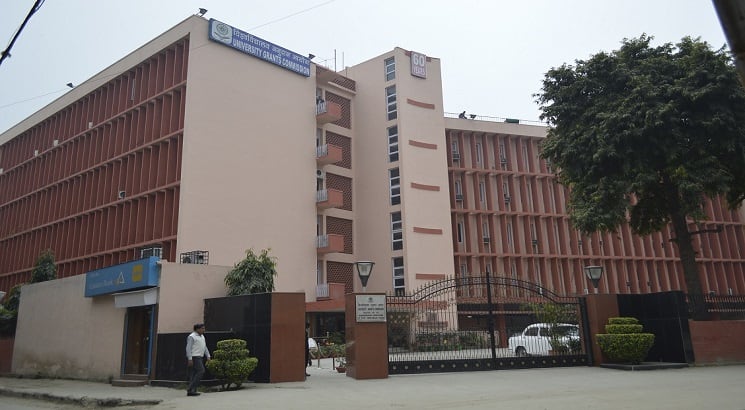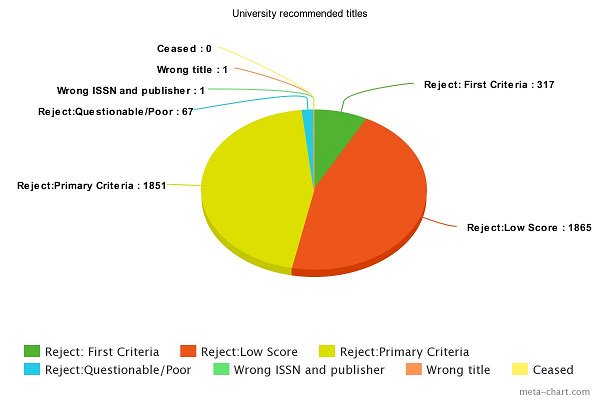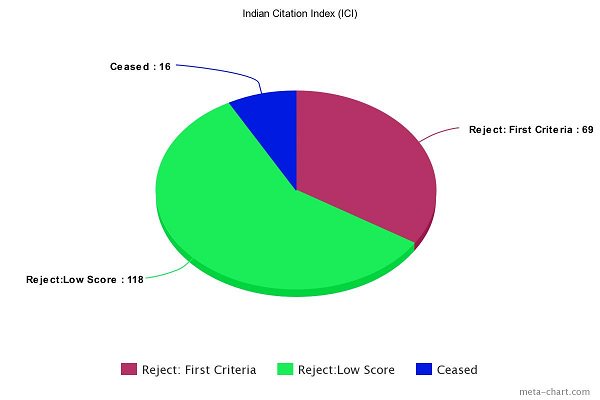Did UGC hurriedly reject 4305 Journals or was there a thought-process involved?
Abhay Anand | May 8, 2018 | 06:05 PM IST | 6 mins read

NEW DELHI, MAY 8: While University Grants Commission (UGC) recently struck off as many as 4305 journals from its list of approved journals, academic experts have questioned the entire exercise even as the drastic measure puts in doubt the credibility of scholars published in the those ‘axed journals’.
“What were these so-called thousands of sub-standard journals with fake claims doing in the UGC list?” asked a researcher questioning the huge number of journals removed from the list of 32,659 journals.
Many academicians also termed a few criteria like “absence of full postal or email addresses of their Chief Editor and Editors on their website” as a flimsy ground for removing journals from the UGC list. The dissent is also strong because there was no warning before the journals were removed from the list.
Prof. K.R.S. Sambasiva Rao, Vice Chancellor, Mizoram University said, “Before identifying and removing over 4000 journals from the list they should have been given some time as it causes a lot of inconvenience to people who have published in these journals as UGC has not said anything about the research papers already published in the journals that have been removed.”

Of the 4102 University recommended titles that did not qualify under the existing evaluation criteria, as many as 1865 have been rejected for having a low score, 1851 under the primary criteria, and 317 under the first criteria, 67 journals have been found to be of questionable credentials or poor quality. Two journals have been rejected as they have been found to be of having ‘Wrong Title’ and ‘Wrong ISSN and Publisher.’

Also, as many as 203 Indian Citation Index (ICI) journals have been removed from the list of which 16 have ceased publication, 69 have been rejected on ‘first criteria’ of the UGC- Scope, Coverage and Methodology Used for Preparing the UGC-approved List of Journals; while 118 have been rejected as they were found to be of ‘low score’.
Is it really for low-quality journals?
The UGC, the apex higher education regulatory body in the country has claimed that it has been receiving e-mail complaints about the inclusion of fake, questionable or predatory journals from research scholars, students as well as from the academic fraternity.
The UGC Notification says, “...Considering these complaints, the Standing Committee on Notification of Journals re-evaluated every journal title recommended by universities as well as those indexed by Indian Citation Index on filtering criteria defined by the Standing Committee.” Based on careful scrutiny and analysis, 4305 journals are removed, in addition to these journals, 191 titles covered in Indian Citation Index are pending for evaluation by the Standing Committee on Notification of Journals.
The Commission has also asked the Universities to double check their respective recommendations and inform the UGC, in case an un-deserving journal has been inadvertently included in the list submitted by them.
The academics and scholars are worried that many of the journals rejected by the UGC were listed on the UGC website for years and they have been publishing there, now articles already published in these journals will carry no value thus hampering their future negatively.
A JNU Professor, who did not wish to be identified, said, “This is a right move on part of the UGC. However, there could have been some more discussions done with senior-level researchers to arrive at the final list as some reputed journals have been excluded. We would expect that the UGC periodically reviews the list to weed out the undesirable journals and increase the ranks of the deserving ones. This would be a right step in the improvement of the quality of research.”
“The teachers and researchers have to publish in journals which are on the UGC List for career progression therefore, UGC needed to keep pruning the list from time to time and also find ways which should not affect the career of academicians,” he added.
What will be the future of scholars who have published in ‘UGC Rejected’ journals? he asked.
One of the important reasons behind this mushrooming of journals has been the importance given to articles published in reputed journals for appointment and promotions by the UGC. As per the UGC, ‘Articles published in UGC-approved List of Journals are considered for the purpose of Career Advancement Scheme (CAS) and Direct Recruitment of Teachers and other academic staff as required under the UGC (Minimum Qualifications for Appointment of Teachers and other Academic Staff in Universities and Colleges) Regulation, 2016.’
A former Delhi University Vice-Chancellor (on condition of anonymity) backed the decision UGC has taken. He, however, cautioned that as there were some old and popular journals in the list they should have been informed first before removal from the list as it badly affects the career growth of scholars who have published in these journals.
Predatory Journals- These journals are exploitative open-access academic publishing business model that involves charging publication fees from authors without providing the editorial and publishing services associated with legitimate journals
What led to the mass rejection of journals?
Last year, the UGC rejected nearly 800 journals on similar grounds, at present, there are 32,659 journals approved by it.
In March this year, a study conducted by the Prof Bhushan Patwardhan from Savitribai Phule Pune University and others after study of 1009 journals found that close to 88 percent of journals were of ‘Low Quality’. Read the full story here.
The UGC approved list of journals has been criticized several times by scholars over the inclusion of many sub-standard journals. Many Universities have been found to have framed their own guidelines for research publications looking at the increasing menace of low-quality journals.
Former UGC Chairman, Prof Sukahdeo Thorat speaking on the development said that the removal of journals is a right move. He said, “The UGC standing committee must have found some problem with these journals and therefore they would have removed it. It’s an ongoing process.”
The proponent of recent UGC move are claiming that this is a much-needed step as many of the journals lacked novelty, were promoting plagiarism, had vague grammatical mistakes and lack of sufficient literature supports. The other reason for removal these journals has been that the articles published in these journals were not adding anything to the existing knowledge.
Axing of leading journals
The UGC has claimed that it has removed journals which were of low quality. However, there are some reputed journals that have been removed thus raising serious questions on the whole process adopted by the Commission to reject journals.
The whole controversy on the issue erupted after reports came of rejection of Economic and Political Weekly, one of the respected social science journal. However, later it was found that the ISSN code in the list (entry 3509) was that of the online version of the journal.
The popular and several decade old journals rejected by the UGC include ‘Journal of Scientific Temper’ published by NISCAIR; ‘The Lancet Public Health’ journal published by The Lancet;
‘Indian Journal of History of Science’ published by Indian National Science Academy; ‘Journal of Indian Ocean Archaeology’ published by Indian Archaeological Society; and ‘Lalit Kala Akademi’ published by the National Academy of Art.
The UGC has not even spared some of the popular journals published by central universities like the University Delhi, JNU, AMU, BHU, Osmania, Calcutta, Mumbai University, etc owing to their low quality.
The research activities in Indian higher education institutions are not up to the global standard owing to the lack of incentive for research and publication. Last year, librarian Jeffrey Beal (University of Colorado, Denver) came up with his list of predatory journals of which as many as 84 were found in the last years UGC’s list and ironically as many as 71 of these journals are nowhere in the list of 4305 published by the UGC, raising a serious question on the whole pruning process followed.
Follow us for the latest education news on colleges and universities, admission, courses, exams, research, education policies, study abroad and more..
To get in touch, write to us at news@careers360.com.